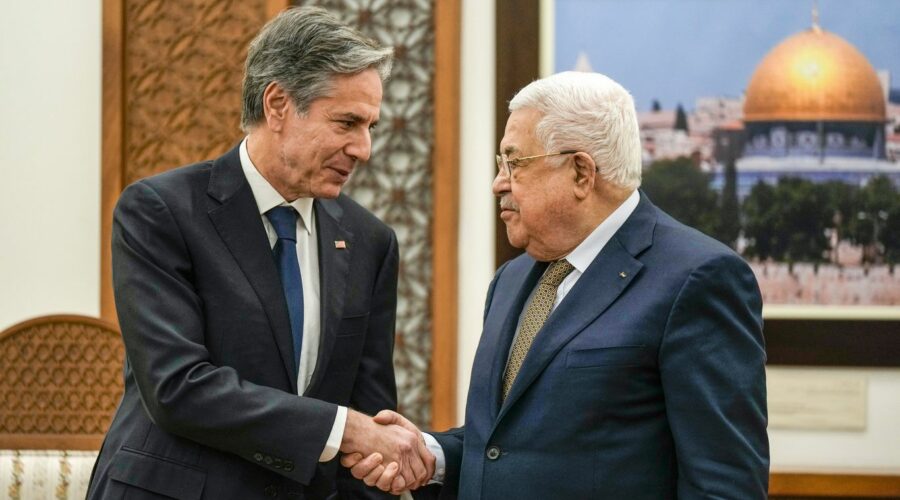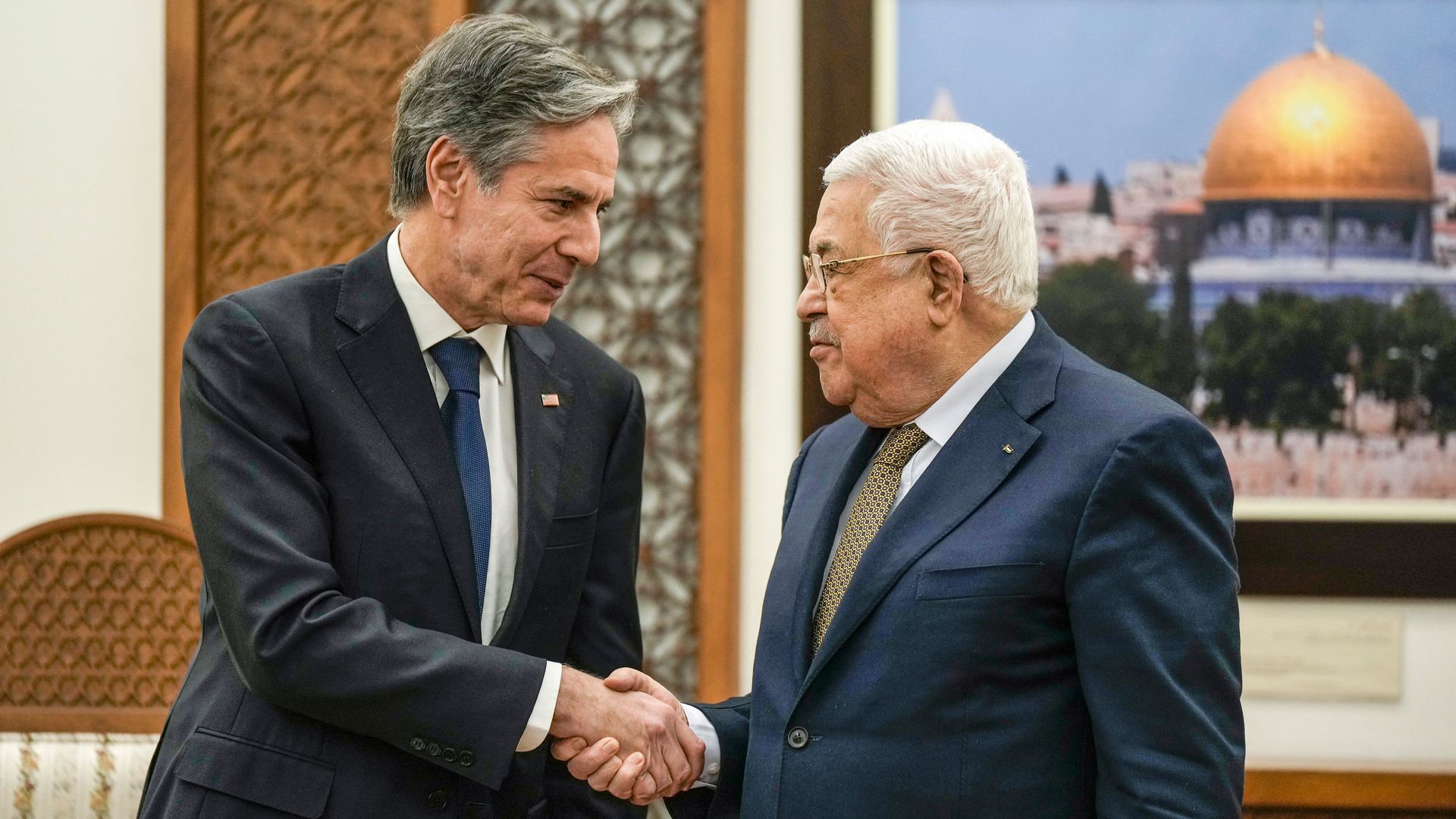Blinken pressed Abbas to accept U.S. security plan for Jenin and Nablus
Secretary of State Tony Blinken meets Palestinian President Mahmoud Abbas in Ramallah. Photo: Majdi Mohammed/AFP via Getty Images
Secretary of State Tony Blinken pressed Palestinian President Mahmoud Abbas to accept and implement a U.S. security plan aimed at reestablishing Palestinian Authority control over the cities of Jenin and Nablus, which have become centers of unrest in the occupied West Bank, U.S. and Israeli officials told Axios.
Driving the news: The Biden administration is looking for ways to de-escalate the situation in the West Bank and prevent it from deteriorating into a third intifada.
- U.S. and Israeli officials say they see the decrease in the PA’s security control as a key reason for the escalation.
- Abbas, meanwhile, has blamed Israel and thethe "lack of international efforts to dismantle the occupation."
Catch up quick: The PA and its security forces have been weakened over the last three years, especially in the northern West Bank where they lack popular support due to an ongoing economic crisis, alleged corruption, and the lack of progress in the Israeli-Palestinian peace process.
- This has led to the PA effectively losing control in Jenin and its refugee camp, which are now mostly controlled by armed groups affiliated with the Islamic Jihad and Hamas, as well as Fatah members who don't adhere to the PA's leadership.
- The PA has more control in Nablus, but armed militias not affiliated with any political faction are also gaining a foothold, especially among young Palestinians.
- The two cities have seen ramped-up Israeli military raids over the last year. Many of the Palestinians who have carried out recent attacks against Israeli soldiers and settlers, as well as citizens inside Israel, have come from these two cities.
- Israeli officials say the Israeli military raids Jenin because the PA security forces are not doing it themselves. Palestinian officials say the Israeli incursions erode their ability and legitimacy to act against the militias.
The latest: In the days before Blinken’s visit, the West Bank saw the most serious escalation in more than a decade after the Israeli military killed 10 Palestinians during a raid in the Jenin refugee camp on Thursday.
- Most of those killed were armed members of Hamas and the Islamic Jihad, but an elderly woman was also killed and at least a dozen civilians were wounded.
- Hours after the raid, the PA suspended its security coordination with Israel, raising concerns that the situation in the West Bank could deteriorate even further.
- A day later, a Palestinian man from East Jerusalem killed seven Israelis outside a synagogue in Jerusalem in what was the deadliest attack against Israelis since 2008.
Behind the scenes: During his meeting with Abbas in Ramallah on Tuesday, Blinken stressed that one of the most important steps the PA needs to take in order to de-escalate the security situation is to accept and implement a security plan that was drafted by U.S. security coordinator Lt. Gen. Michael Fenzel, U.S. and Israeli officials say.
- According to the U.S. and Israeli officials, Fenzel’s plan lays out how the Palestinian security forces can regain control over the northern West Bank, mainly in Jenin but also in Nablus.
- The plan includes the training of a special Palestinian force that would be deployed to this area to counter the militias, the officials said.
- Fenzel presented his plan to the Israeli government and to the PA several weeks ago.
While the Israelis supported Fenzel's plan, the Palestinians had many reservations, the U.S. and Israeli officials said.
- Palestinian officials told Fenzel that the plan was problematic because it didn't include any demands from Israel, like decreasing IDF incursions into Palestinian cities, different sources said.
- According to the sources, the Palestinians also claimed the plan doesn't take into consideration the need of the PA to build public support for such an operation.
- The Palestinians told Fenzel they don't have the legitimacy to operate during the day when the Israeli military conducts raids that leads to Palestinian deaths at night, the sources said.
- Abbas’ aides didn’t respond to requests for comment. The State Department declined to comment.
Blinken also urged Abbas to resume security coordination with Israel.
- Egypt and Jordan did so, as well, and called on the PA to take steps to improve the security situation in the West Bank. Shortly before his meeting with Blinken, Abbas hosted the Egyptian and Jordanian intelligence chiefs.
What they're saying: In a press conference at the end of his trip, Blinken said without elaborating that there are "some concrete ideas from both sides that, if pursued, would really help diffuse the current situation."
- "The immediate task is to diffuse this cycle of violence. … Neither side should take any unilateral actions that, right now, potentially would add fuel to a fire," Blinken said.
What to watch: Blinken said he instructed Barbara Leaf, the assistant secretary of state for Near East Affairs, and Hady Amr, the special representative for Palestinian Affairs, to stay in the region to discuss "constructive ideas for practical steps that each side can take to lower the temperature, to foster greater cooperation, to bolster people’s security."
Source: Read Full Article


